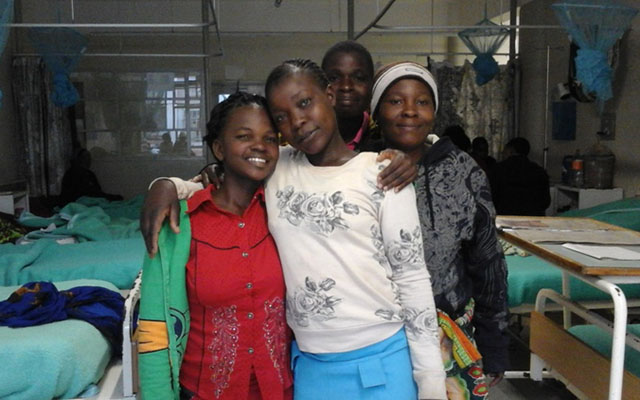Fistula, HIV: Woman’s nightmare


Katherine Manjengwa (far right) with friends at Chinhoyi Hospital
Roselyne Sachiti Features Editor
Katherine Manjengwa (25) of Siamuchimbo area under Chief Nenyunga in Binga, Matabeleland North is an open book.
In fact, she is an open, angry, heartbroken and emotional book when she talks about her life living with fistula.
Her decision to trade her police training place for marriage to a man her father despised has set in motion a chain of some irreversible events. First, she gave birth to twins and lost one of the babies because of prolonged labour caused by her delay to seek medical help.
Then, doctors at Gokwe Hospital left three pairs of operating scissors in her uterus after they performed a Caesarian section to remove her dead baby and save the other.
She also has fistula because of the prolonged labour, which stretched a week, and does not know if she still has a uterus since she no longer menstruates. Katherine was also told she is HIV positive at a time she thought she would finally go for fistula repair surgery.
Her husband John Mapitirwa (25) thinks she is cursed and now despises her. Katherine says since she got fistula, Mapitirwa has been promiscuous with women of different shapes, size, skin colour and ages.
As she puts it; “My husband now thinks he is God’s gift to women.” A strong opinionated woman, her story leaves her crying each time she speaks of the social challenges she has faced as a result of fistula.
Yet, as tears flow, she bravely tells her story from her hospital bed and wants the world to know of the challenges women face as a result of fistula. Fistula is a hole between the birth canal and bladder or rectum caused by prolonged, obstructed labour.
The condition leaves women leaking urine and feaces or both over time resulting in depression, social isolation and deepening poverty. Katherine who has lived with fistula for six years says her problems started in 2011 when she fell pregnant with twins.
For a week, she went into labour at home but did not seek medical assistance despite having been registered at Zhomba Clinic also in Binga.
This first delay to seek medical help was to create all problems she faces today. “It was my first pregnancy and I thought all pregnant women went through this.
“I became worried when my legs started swelling. I went to Zhomba Clinic and was immediately transferred to Gokwe Hospital. A Caesarian section was conducted but one of my babies was dead. The other survived.
“Because of prolonged labour, I had developed a fistula and urine and feaces started leaking after the Caesarian section. I was moved to Gweru Hospital, but doctors quickly transferred me to Mpilo Hospital in Bulawayo,” she says.
In Bulawayo, doctors tried their best to repair the fistula but only managed to stop the feaces from dripping. Following the surgery, Katherine returned to Binga, the chilling experience of losing a child haunting her.
Even as she settled back home with the remaining baby in the warm weather which engulfed Binga, it became more difficult for her to escape the chilling experience.
“The urine never stopped. It would leak as I walked, sat, slept and even as I became intimate with my husband. “My husband could not tolerate the urine. It was hard to go to public gatherings like funerals,” said Katherine who is among the 30 women awaiting fistula repair surgery at Chinhoyi General Hospital in Zimbabwe’s Mashonaland West Province.
Before all this happened, she had no knowledge of fistula.
Fistula and scissors
As if living with fistula was not enough punishment, Katherine got another shock. “I started noticing some puss coming from my private parts. I could feel some sharp pains in my uterus.
“I could not sit as the pain became intense. I went to Mpilo Hospital, and doctors discovered that three pairs of scissors had been left in my uterus. “They removed them and I returned home, but the fistula problem was still there,” she explains.
Adds Catherine: “I almost became crippled because of this condition. At some stage, I found it hard to walk. I was in hospital for one and a half years and confined to a wheelchair. I went for physiotherapy and was also treated for bed sores.”
Hope and family support
In 2016, Katherine’s friend, Alice, told her of the fistula repair centre established in Chinhoyi. After losing her child during prolonged labour, Alice also had her fistula successfully repaired and was pregnant again.
Katherine’s father also encouraged her to go for the surgery after a nurse he spoke to at a meeting told him about the fistula repair camps. “When I called the number, Fortunate Mabhande told me to come. I did not have money to travel from Binga to Chinhoyi. She told me my travel costs would be covered and treatment would also be free. I immediately came,” she explains.
At Chinhoyi General Hospital, Katherine joined 29 other women also waiting to undergo the fistula repair surgery.
“I felt so much better when I got here. I met many other women with the same condition. We became close. “I watched them going into surgery and coming back healed. I was convinced that my problem would soon be history. No more leaks, no more stress,” she adds.
Fistula and HIV
Katherine was both anxious and excited as she waited for her turn. She did not know another hurdle stood her way. This time it was not money, everything was provided for her to undergo free surgery which usually costs $900.
She sat on her hospital bed, hoping to hear the nurses call out her name that she was next for surgery, yet what came next shattered her dreams. She was told she could not go for surgery as she had tested HIV positive.
She just watched other women in her ward go to surgery and come back healed, embraced and congratulated them. “When we arrived at the hospital, we went through a series of tests that included HIV. This is done to every woman before surgery. I was told I am HIV positive and as such, I cannot go for surgery now.
“They counselled me and have put me on the antiretroviral treatment (ART) programme and told me to go home. I am hurt that I have HIV. “What will I tell my father? How will I tell him that I have HIV?” Katherine says as she breaks down and cries.
The day is Tuesday, June 27 and Katherine who has known her status for four hours now has not told Mapitirwa yet. He calls her cellphone to check on her but she does not answer.
At this moment, she says she hates him with a passion, as she believes he is the one who infected her with HIV. She says she would rather continue with the interview than talk to him. She would tell him that she is HIV positive when she sobers up.
Fistula and dysfunctional marriages
Katherine reveals that from the time she had fistula, she has seen many women come into and out of her husband’s life. She says Mapitirwa allegedly has had unprotected sex with all the women as this happened on her bedroom floor as she painfully watched.
But despite this, she carried his picture to the hospital and keeps it to the locker next to her bed though she now feels like shredding it into pieces.
“When he knew I had fistula, he started sleeping around and he still does. “He would bring women into our home saying that he wanted a baby. I could not give him a baby because of the fistula and failure to menstruate. I stopped menstruating after the C Section.
“I would sleep on the bed while he slept on the floor with women he brought home. “At one time, he had a sexually transmitted disease and I asked him where he got it from. I just prayed that God would punish him and make his manhood fall. He does not want to go for HIV testing,” she further alleges.
She adds: “When I was pregnant, nurses at the clinic told him they would not register me for pre-natal care if he did not come with me for the HIV test. We were both HIV negative back then.”
Katherine says what surprises her is that her husband has not achieved his dream of having more children and no woman, even those who have slept on her bedroom floor has come to her house claiming she is pregnant.
She also adds that the village gossips, usually the first with such juicy information have not said anything to that effect. Katherine says she now puzzles on how to collect her ARVs. She pleads with nursing staff to write a referral letter so that her aunt who lives in Kwekwe can collect them on her behalf and post them on a bus to Binga.
“Our clinic in Binga is too far. My husband drives his brother’s car. They use it to carry people, but will not agree to go with me. He always tells me the car has no diesel. I want to take my ARVs so that I come back soon for the surgery. I do not want to live with fistula anymore,” she adds.
Fistula and Gender Based Violence
According to Katherine, fistula has also brought other problems like violence in her home. “My husband drinks too much alcohol, smokes marijuana and sometimes becomes aggressive when I confront him. “Maybe that is his way of handling my fistula,” she explains.
She also shares some moments when she, too, has been a perpetrator of violence — an act that fed the rumour mill with enough information that almost brought the village to a standstill.
“One day my husband was drunk, viciously shoved and pushed me off the bed saying he wanted to sleep alone. He fell on the bed, his shoes and clothes on.
“When he slept, I took a big needle and thread, sewed the blankets covering him to the mattress. He was too drunk to see what I was doing. “I hit him until I felt relief while he was trapped between the blankets and mattress. Our neighbours heard him crying and forced open our bedroom door. They called my father fearing that I would end up killing him,” she recalls.
Hours later, a nurse calls Katherine to a room where doctors conduct a scan to check if she still has her uterus, a procedure she has been anxiously waiting for.
She comes back happy, at least she has received good news on a day that started off depressing. The doctors found her uterus. Katherine now waits for her bus fare, to go back to Binga and come back after three months. She hopes by this time, her fistula will be repaired.
She is not so keen to go home as she fears she will find her husband with another woman in their bedroom. And if that happens, she says she will leave him for good and get a job.
Partnerships that repair broken lives
Through collaborations, UNFPA and its partners like the Women and Health Alliance International (WAHA) has been supporting Zimbabwe’s Ministry of Health and Child Care in addressing the fistula problem.
WAHA International, National Outreach coordinator, Fortunate Mabhande said to date, 345 women have benefited from the fistula camps. Another 60 are currently in the camp and once they are all operated on, the number will go up to 405.
“We hope that Government will allow us to continue with the programme and repair fistulas of 240 women per year. “We also hope more fistula repair centres will be established in all the country’s provinces. It is hard for women with fistula to travel long distances while they leak urine all the time.
“We just do not repair fistulas, we also train our local doctors from provincial hospitals so that they continue helping affected women for free,” she said.
She said in addition, a total of 12 doctors and 46 nurses are receiving training in pre and post-operative management of obstetric fistula through a mentorship programme led by WAHA.
Ms Mabhande added that the issue of HIV and other illness is like psychological trauma to the women. “We do not want them to be repaired and not recover fully. We give them a chance to go home and try our best to psychologically prepare them so that they will come back and be treated. “We are only sending them home for treatment so that when they come back they can be successfully operated on.
“In cases where HIV positive women do not fully understand why we are sending them home because of the HIV status, we keep them here longer and counsel them until they understand we have not turned them away but want them to recover and come back. We also discourage discrimination,” she said.
She added that they have a rehabilitation village at the hospital where women spend time learning more about HIV. At Chinhoyi General Hospital, Ethiopian obstetrician gynaecologist, Dr Ambaye Michael is training and mentoring Zimbabwean doctors that include Dr Mirriam Kanyenze (Mutare), Dr Mpumelelo Sibanda (Bulawayo) and Dr Julius Chirengwa (Masvingo).
Dr Michael said they have registered a 97 percent success rate since the programme started and only 3 percent failure rate. She attributed the 3 percent failure rate to the health state of the patient citing diabetes, double fistula, RVs and IVVFs as the major causes.
- [email protected] or [email protected]
- Twitter @RoselyneSachiti











Comments